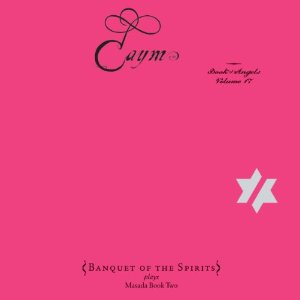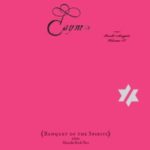
What happens when prolific artists and exotic worlds collide?
See if you can follow this one. Caym is the 17th release in John Zorn’s Book of Angel’s series, which is the follow up to his Masada songbook that consisted of 10 proper albums as well as a number of live releases. It is performed by Cyro Baptista and the Banquet of the Spirits and arranged by Shanir Ezra Blumenkranz, a member of the band who plays bass, oud and gimbri(1) on the album.
Putting the navigation of the creators, collaborators and their histories aside, Caym is 50 minutes of swirling exotica, navigated by four excellent players who all have their moments in the baked desert sun of which the music is so evocative.
A longtime Zorn collaborator dating back to the eighties, Baptista is easily the most recognizable name attached to the album but it is by no means a solo effort with mere sidemen. In addition to Baptista and Blumenkranz, Tim Keiper adds another layer of percussion while Brian Marsella rounds out the quartet on Keyboards. You might think that Caym could be weighed down by all this percussion but it’s simply not the case, at no time do any of the tracks threaten to devolve into some sort of Moroccan drum circle.
In a way the album almost approaches a minimalist construct, at least by Zorn’s standards, which is very surprising given that both he and Baptista have never shied away from maximalist expressions of dissonance and general bombast. Make no mistake, this isn’t a Phillip Glass tribute, but every note played has purpose and the pieces are executed in a very concise manner. Kudos should go to Blumenkranz for this, his skill in arranging the album trims some of the excesses of a typical Zorn collection.
He also holds the foundation with downright concrete bass playing. Take “Tzar Tak,” the album’s fifth and most danceable track. A pumping, two note bass riff underpins it, and makes the modulation up a step that occurs midway through the track much more dramatic than it probably should be. Throw in some soaring keyboard work from Marsella that harkens back to Bernie Worrell’s work with the Talking Heads and you have the fulcrum of album.
The flow of Caym alternates between more atmospheric pieces like “Zapahaniah,” with its Reich-ian ambiance and “Flaef,” a hypnotic solo piece for the oud, and more expansive rave ups like the opener “Chamiel” and “Tahariel.” “Matafiel,” the second track, falls into the latter category. It starts out with a barely perceptible drone that gives way to a sublime thirty seconds of half scatted, half chanted incantations, harmonized with a staccato oud line. Just that opening half minute will haunt you for days and send you scrambling back to the beginning over and over just to try to figure how the collective achieves that trance like effect. “Yeqon” seems like it was destined for something David Lynch was attached too at some point. Its eerie riff loops through the track, slowly building from a laconic wobble to a cascading death march that would have fit right in with Lynch’s cinematic surrealism. Equally surreal, for different reasons, is the albums closer, “Phlaeg” a baroque solo piece for the organ that is stylistically divorced from the rest of the album. It is a jarring way to close out the set as it is closer in style to J.S. Bach than C. Baptista.
For those wondering where the percussive fireworks are hidden the answer is “Yahel.” The opening stanza is a beguiling and powerful salvo of machine gun drum work. Like “Matafiel” before it you will find yourself once again circling back to the “Yahel”’s intro as well.
It is little chestnuts like these, and the quality of musicianship on display throughout that make Caym worthwhile. To call it world music might be an insult, especially if you have flashbacks to your mom’s Enya cd’s or if Yanni’s Grecian mug smiles upon your subconscious when you hear the term. Instead Caym is inspired music of the world put forth by Banquet of the Spirits.
***
(1) Think of the Oud as an Arabian fretless guitar/mandolin hybrid and the Gimbri as a fretless bass/banjo hybrid. In the interest of full disclosure, lest you think I am some sort of exotic instrument expert, I looked this all up on Wikipedia.



No Comments comments associated with this post